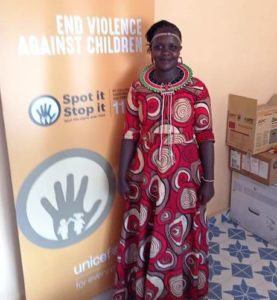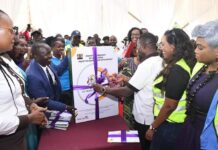By Caren Waraba, DevReporter, West Pokot County
The constitution of Kenya article 53 recognises the right of all children to be protected from all forms of abuse and violence. But most communities do not understand what the law says about child labour and therefore, find themselves engaging children in tedious activities, which is against the law. An example is gold mining activities along River Marich where the youth, most of them school drop outs, are engaged.
Since there is inadequate land to use for farming activities, the residents of Marich region in West Pokot have to engage in minining activities, say Cyrus Kalem and Evans Juma, both residents of the area.
After mining little gold, Kalem and Juma add that the residents have to travel long distances to look for market, but they are let down by the middle men.
“You may be harvesting gold from Monday to Friday then on Saturday you travel to Ortum, where you can sell a point at 300 shillings while a gram at Ksh 3000. From Marich to Ortum you will use around Ksh 200, then after arriving there you may lack someone to buy your gold. You are then forced to stay there for 2 days or 1 day, already all the money is finished”
Young mothers mining gold
Noline Cheptoo, a mother of three, said mining gold is the only way to feed her children.
“This work is very tedious, but we are forced to do it because we have no other alternative… It is only us women who struggle to do this work of mining,” said Noline.

Statistics
Research by United Nations International Children Emergency Fund (UNICEF)/Kenya National Bureau of Statistics (KBS) indicate that 8.5 percent of children are engaged in child labour where boys are sent out to herd livestock or harvest sand, while girls are married off early or engaged in domestic work.
The National Council for Nomadic Education in Kenya also notes that girls and boys between the ages of 13-15 years in West Pokot County do not attend school due to underlying reasons like traditional norms, pastoralism, Female Genital Mutilation, child labour and early marriage.
Africa leading in child labour
The latest global estimates indicate that the number of children in child labour has risen to 160 million worldwide an increase of 8.4 million children in the last four years, according to Relief Web 2021. Sixty three million girls and 97 million boys were in child labour globally at the beginning of 2020, accounting for almost 1 in 10 of all children worldwide. https://reliefweb.int/report/world/child-labour-global-estimates-2020-trends-and-road-forward
Solutions
The level of school drop outs in Kenya will decrease if the Ministry of Education continuously provides food in schools, increase co-curriculum activities, provide free education and mentorship programmes.
Mrs Edith Lorema, a child protection officer in West Pokot County said the church needs to be included in each and every step of a child’s upbringing to help curb illiteracy in the community.

Related stories
https://www.unicef.org/kenya/stories/lets-end-child-labour-kenya






